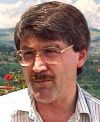 Paul DaviesPaul Davies is theoretical physicist, cosmologist, astrobiologist, author and broadcaster. He currently holds the position of Professor of Natural Philosophy in the Australian Centre for Astrobiology at Macquarie University. His previous academic appointments were at the Universities of Cambridge, London, Newcastle upon Tyne and Adelaide. His research has ranged from the origin of the universe to the origin of life, and includes the properties of black holes, the nature of time and quantum field theory. Davies is well known as the winner of the 1995 Templeton Prize - the world's largest annual prize - for his work on science and religion. In addition to his research, Professor Davies is well known as an author, broadcaster and public lecturer. He has written over twenty-five books, both popular and specialist works, which have been translated into many languages. He writes regularly for newspapers, journals and magazines in several countries, and has been a longstanding contributor to The Economist, The Guardian, The New York Times, The Australian, The Sydney Morning Herald, The Age, The Bulletin and New Scientist. He was for two years a weekly opinion columnist for the Adelaide Advertiser. Among Davies's better-known media productions were a series of 45 minute BBC Radio 3 science documentaries. Two of these became successful books and one, Desperately Seeking Superstrings, won the Glaxo Science Writers Fellowship. In early 2000 he devised and presented a three-part series for BBC Radio 4 on the origin of life, entitled The Genesis Factor. His television projects include two six-part Australian series The Big Questions and More Big Questions and a 2003 documentary on BBC4 about his work in astrobiology entitled The Cradle of Life. This media work was recognized by the award of the 2001 Kelvin Medal by the UK Institute of Physics and the 2002 Michael Faraday Prize by the Royal Society for his contributions to promoting science to the public. In April 1999 the asteroid 1992 OG was officially named (6870) Pauldavies in his honour.
|
|||||||||||||||

